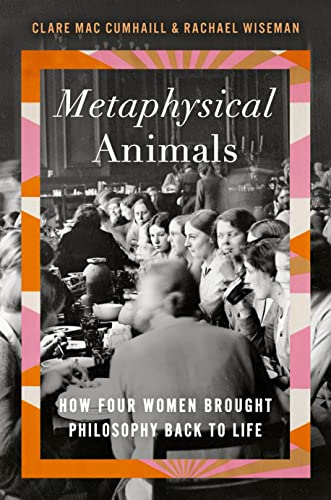🕠Obtain Metaphysical Animals: How Four Women Brought Philosophy Back to Life by Clare Mac Cumhaill
Metaphysical Animals: How Four Women Brought Philosophy Back to Life by Clare Mac Cumhaill

A vibrant portrait of four college friends—Iris Murdoch, Philippa Foot, Elizabeth Anscombe, and Mary Midgley—who formed a new philosophical tradition while Oxford's men were away fighting World War II. The history of European philosophy is usually constructed from the work of men. In Metaphysical Animals, a pioneering group biography, Clare Mac Cumhaill and Rachael Wiseman offer a compelling alternative. In the mid-twentieth century Elizabeth Anscombe, Mary Midgley, Philippa Foot, and Iris Murdoch were philosophy students at Oxford when most male undergraduates and many tutors were conscripted away to fight in the Second World War. Together, these young women, all friends, developed a philosophy that could respond to the war’s darkest revelations. Neither the great Enlightenment thinkers of the past, the logical innovators of the early twentieth century, or the new Existentialist philosophy trickling across the Channel, could make sense of this new human reality of limitless depravity and destructive power, the women felt. Their answer was to bring philosophy back to life . We are metaphysical animals, they realized, creatures that can question their very being. Who am I? What is freedom? What is human goodness? The answers we give, they believed, shape what we will become. Written with expertise and flair, Metaphysical Animals is a lively portrait of women who shared ideas, but also apartments, clothes and even lovers. Mac Cumhaill and Wiseman show how from the disorder and despair of the war, four brilliant friends created a way of ethical thinking that is there for us today. Read more
It is a little bizarre that this book was published by the same publisher (Oxford Uni Press) who had published a book on the same four women philosophers shortly before this, in the same year. That other book is called ‘The Women are Up to Something’ and subtitled, ‘How Elizabeth Anscombe, Philippa Foot, Mary Midgley, and Iris Murdoch Revolutionized Ethics’. It was written by Benjamin J B Lipscomb, an American philosophy professor. Since both books are scholastically researched, it probably explains the many uncanny similar references. For example, where Lipscomb writes, ‘Scrutton might easily have passed Iris Murdoch on the pavement in front of her tutor’s house in Chiswick’, Cumhaill & Wiseman writes, ‘Mary may have dodged past Iris in Mrs Z’s hallway that summer…’. The coincidence is all the stranger since these were not lines of importance in either book. The similarities also involve chapter titles. Lipscomb has ‘Oxford in Wartime’, Cumhaill & Wiseman have ‘Learning in Wartime’. Both have ‘On Probation’. All that aside, both are excellent books, both well-written although Cumhaill & Wiseman focussed on the four philosophers whereas Lipscomb examines them and their philosophies and works in equal measure. Cumhaill & Wiseman wrote this book intending mainly to inspire women; Lipscomb for everyone. Hence, although Cumhaill & Wiseman relished the crossing of swords between the four women and their male counterparts, only the parts they claimed to have come out better are discussed. Thus, Mary Midgley’s lost cause against Richard Dawkins received no mention in ‘Metaphysical Animals’. It was a major battle. Midgley thought Dawkins knew no philosophy, and Dawkins thought Midgley ignorant of biology. ‘Metaphysical Animals’ discusses Philippa Foot’s philosophical views regarding A J Ayer’s and though Cumhaill & Wiseman set out the fundamental question of great importance, formed by Foot, namely, ‘could there be a secular philosophy that could use the language of morals, and speak of objective moral truth’, a question prompted by Ayer’s opposing view based on moral subjectivism, it is clear that Foot did not find the answer. It also appears that Cumhaill & Wiseman, in glorifying Anscombe’s undoubtedly brilliant mind, emphasised her sharp questions regarding evidence and truth. ‘We are the sort of creatures who draw conclusions from evidence, and who ask: “Why did that happen?” “Why do you think that?”, “What are your reasons?”, yet seem oblivious to Anscombe’s devout Catholicism and her belief in transubstantiation. Anscombe, does admirably stood up against Oxford’s giving of an honorary degree to Harry Truman, former President of the USA. She opposed that move because Truman signed the order dropping two atomic bombs on Japan.
Publisher -> Doubleday (May 10, 2022) Language -> English Hardcover -> 416 pages ISBN-10 -> 0385545703 ISBN-13 -> 978-0385545709 Item Weight -> 1.67 pounds Dimensions -> 6.38 x 1.37 x 9.54 inches Best Sellers Rank: #6,531 in Books (See Top 100 in Books) #1 in Feminist Literary Criticism (Books) #3 in Individual Philosophers (Books) #3 in Women Writers in Women Studies
Read Book Metaphysical Animals: How Four Women Brought Philosophy Back to Life
(EPUB) Download Metaphysical Animals: How Four Women Brought Philosophy Back to Life Full Page
(Get New Books) Metaphysical Animals: How Four Women Brought Philosophy Back to Life
*G.e.t [Books] Metaphysical Animals: How Four Women Brought Philosophy Back to Life /a>
(Obtener libros nuevos) Metaphysical Animals: How Four Women Brought Philosophy Back to Life
[Skaffa] (Epub) Metaphysical Animals: How Four Women Brought Philosophy Back to Life
[Faitau] PDF Metaphysical Animals: How Four Women Brought Philosophy Back to Life
Comments
Post a Comment